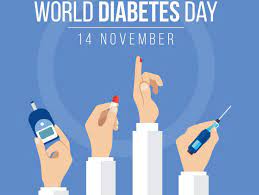TBB BUREAU
NEW DELHI, NOV 14, 2021
Attaching clear and simple specific warning labels to the front of food packaging (FOPL) that can be easily comprehended by all, will help cut down consumption of high fat, sugar and sodium. This would ensure reducing cases of non-communicable diseases (NCDs) like diabetes and cardiovascular diseases in India, Padma Shri awardee and leading endocrinologist Dr. Anoop Misra said, citing the case of Chile where FOPL has been an efficient tool in this regard.
Nutritionist and diabetes educator, Sugandha Kehar also supported the FOPL saying that labeling can help people including mothers make better and healthy choices for their kids and family.

During a discussion with Gaurav S. Karrir from Institute for Governance, Policies and Politics (IGPP), an advocacy group, on the World Diabetes Day on Sunday (November 14), Dr. Misra minced no words as he said that while the developing countries like Chile has successfully adopted the FOPL and brought down NCDs rate, India’s top food regulator FSSAI has been just busy holding a series of debates on the issue since 2013 with no outcome.
The senior health expert explained how Chile has taken a slew of mutually reinforcing policies. “It has mandated front-of-package warning labels, restricted marketing to children, and banned in-school sales of packaged foods and beverages high in calories and added sugar, sodium, or saturated fat and exceeding set thresholds for these nutrients or for overall calorie content to carry FOPL — black octagon(s) with the words high-in sugar, sodium, saturated fat, and/or calories, whichever applies.”
“The results have been encouraging. These products saw a reduction in the consumption of sugary drinks by 23%,” said Dr. Misra, who is the Executive Chairman of Fortis C-DOC Hospital for Diabetes and Allied Sciences, having more than 30 years of experience in teaching, service, research and community health intervention programs.

The World Health Organization (WHO) has also found that such regulations are instrumental in reducing obesity globally. In India, more than 77 million adults are living with diabetes. The number is expected to reach 134 million by 2045 as per the International Diabetes Federation (IDF). NCDs cause an alarming 64.9 percent of the deaths in our country and 40 percent of hospital stays.
With no check on what is being sold in the market, Dr. Misra pointed out that high calories will increase obesity. “Sugar is the single most important factor for obesity and consequent diabetes while high salt results in hypertension and consequent risk of heart diseases,” he said, adding that there is a need to keep a watch on what is being sold in the market.
Reiterating that stringent food policies can help in delivering results, Dr. Misra cited examples of seatbelts norms and anti-Covid measures like putting on masks that have shown positive results after fines were imposed.
Sugandha Kehar pointed out that many food players have been found misleading the labels and they should be dealt with sternly. “Of course more awareness campaigns against HSS laden foods are needed; but more important is implementation of FOPLs that are simple and understandable. We need to treat NCDs as serious disorders,” suggested Kehar.
In his message on the World Diabetes Day, Dr. Misra advised that the people, particularly youth, should strictly follow simple healthy lifestyles such as keeping track of what they eat, maintain the body weight and check their metabolism rate once they attain the age of 25 years.
 The Business Bytes
The Business Bytes
